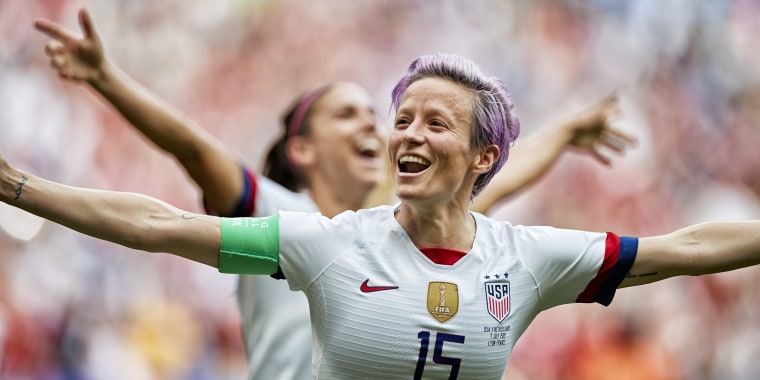The class-action lawsuit calling for equal pay that was filed by all 28 members of the World Cup-winning U.S. women’s soccer team was perhaps the most powerful and provocative story involving sports and politics that we’ve seen over the last five years, and to the delight of many people across the sports world, it ended Monday when all parties settled for $24 million, $22 million of which will be split among the athletes.
None of the money gets released until a new collective bargaining agreement is signed between U.S. Soccer and the players’ union.
The remaining $2 million is to go to charities that benefit women and girl’s soccer programs and to help players with their post-retirement transitions. However, none of the money gets released until a new collective bargaining agreement is signed between U.S. Soccer and the players’ union.
Megan Rapinoe, women’s soccer biggest star and one of the five original players who filed the suit, told ESPN: “There's no real justice in this other than this never happening again. With the settlement of the working conditions and this settlement which is contingent upon a CBA that will have equal pay going forward, there's no other way to look at it than just a monumental win for women's sports and women's soccer, in particular."
But not everyone agrees. In a post on the Sports Fan Coalition blog, former team goalkeeper and Hall of Famer Hope Solo called the decision “infuriating and heartbreaking” and took a shot at Rapinoe and Alex Morgan, perhaps the team’s second-most high-profile player. "They both know this is not a win,” Solo said. “They know it's an easy out of a fight they were never really in.”
Solo wrote: "Read the fine print. 'Contingent upon the negotiation of a new collective bargaining agreement.' It doesn't exist yet and is not guaranteed. If the players had ever been successful in negotiating an equal CBA, there would've been no reason to sue the federation in the first place."
It is a shame and a sin that Rapinoe, Morgan and Solo are not seeing eye to eye on this because they are both making the same critical point. As exciting as this settlement is, it does not mean anything unless a new collective bargaining agreement is signed that guarantees equal pay going forward
The fight over how much the women should be paid galvanized players and fans — the chants of “equal pay” at the World Cup were iconic — while making USA soccer look positively antediluvian. In U.S. soccer, women are the ones who get ratings, win World Cups and become commercial stars; the men tend to lose and lose badly. But the women have been making less money for work that wasn’t just equal, but superior, to their male counterparts. They’ve embodied the old saying that “Women who seek to be equal with men lack ambition.”
It is a shame and a sin that Rapinoe, Morgan and Solo are not seeing eye to eye on this.
Monday’s settlement has not only been embraced by most of the soccer world but also people involved in the general labor movement. Erica Smiley, co-author of the new book "The Future We Need: Organizing for a Better Democracy in the Twenty-First Century," sent me the following email: “The USWNT’s enormous victory for equal pay speaks to the power of collective action and serves as an inspiration for the millions of working women fighting for equal pay for equal work or just having a voice on-the-job. From the soccer players on the women’s national team to the factory workers, fast food workers, educators, and more, we know what is possible when workers are in decision-making roles. The outcomes are almost always better.”
U.S. Soccer President Cindy Parlow Cone believes that a collective bargaining agreement can be signed as soon as March. If that day comes to pass, then let’s break out the party hats, but until then it is wise to keep everyone’s powder dry. There is an old expression in the labor movement that the best way to avoid a strike is to prepare for one. The women's players' union surely knows this. They need to prepare the players that a win on the road to final victory still means that you are on the road and that you have yet to reach the ultimate destination.

